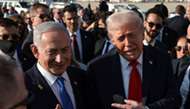▶ NICHOLAS D. KRISTOF
It was cold and drizzling as yet another family made homeless by war arrived in this town in northern Syria to start a new life in a tent.
Khadija al-Ali seemed to be trying not to cry as she explained how in the space of a week she had gone from middle-class housewife to homeless single mother.
Ms. Ali had lived a comfortable life in the northern city of Aleppo with her husband, a tailor, and their three children, ages 6, 3 and 1. Then, a week ago, a Syrian government jet dropped a bomb that destroyed the family house, but no one was home and the family members thanked God that they were safe.
A couple of days later, Ms. Ali’s husband disappeared in Aleppo. Maybe he was arrested at a checkpoint, or hit by a bomb, or targeted by the snipers now common in the city. One Aleppo resident told me about a friend who had been shot by a sniper in the shoulder and leg. It was too dangerous to pull him to safety, and he died on the street two days later.
“I just don’t know what happened,” Ms. Ali told me blankly, while her cousin (who confirmed the story) suggested that the husband is probably dead.
An aid worker from the Syrian Arab Red Crescent arrived with loaves of bread for the family, which the children ate hungrily. When pieces fell to the mud, they picked them up and brushed them off. And blankets are even harder to come by than food.
“I’m afraid my kids will die in this cold weather,” she fretted.
Multiply Ms. Ali by more than a million and you get the scale of Syria’s torment. Already, nearly 40,000 people have been killed in the civil war, and some 2.5 million are displaced from their homes.
President Obama and other world leaders have avoided intervening in Syria for fear of destabilizing the region and empowering Islamic fundamentalists. The West is also nervous of the rebel Free Syrian Army, which includes extremist elements and has committed atrocities itself.
The Western concerns are legitimate, and plenty of Syrians have mixed feelings about the Free Syrian Army. Some fighters engage in looting or kidnapping, and many are poorly trained and unprofessional. (The establishment of a new umbrella coalition of the Syrian opposition, immediately recognized by France, may help a bit.)
My take is that rural Syrians are generally supportive of the Free Syrian Army, while some city dwellers resent it as an armed mob that irresponsibly moves into neighborhoods knowing that the result will be government bombs that will devastate those streets.
It’s also true that Islamic militants and foreign fighters are playing an increasing, but still tiny, role in the combat. Some of that is real, and some is Kabuki: Groups of fighters have realized that the best way to get weapons is to grow beards, quote from the Koran and troll for support in Saudi Arabia and Qatar.
A secular pro-Western businessman who lost his 18-year-old son to a bomb said he didn’t agree with the militants, but he still welcomed them. “They have the humanity to help,” he said, contrasting their assistance with Western indifference.
An imam, a bit distracted because he was preparing to smuggle a rebel flag into Aleppo, at the risk of execution, put it this way: “The Americans are with the Syrians, but they just want to talk.”
There are dangers with greater involvement, and Syria is a more difficult arena to intervene than Libya was, but let’s acknowledge that the existing hands-off approach has failed. Western passivity has backfired and accelerated all that Washington fears: chaos, regional instability, sectarianism and growing influence of Islamic militants.
The United States certainly shouldn’t send boots on the ground. But there are steps we can take to save lives, hasten an end to the war, reduce the risks to the region and protect American interests as well. A sensible menu includes a NATO-backed no-fly zone over parts of northern Syria, transfers of weapons and ammunition (though not antiaircraft weapons) to the Free Syrian Army, training and intelligence support, and cooperation with rebels to secure chemical weapons.
“The government kills us every day, and nobody cares about us,” said Aisha Muhammad, who doesn’t know her age but looked to be in her 70s. She said that a government sniper had shot one of her two sons, costing him his arm, and that the other had been arrested five months ago and not heard from since.
Asked if he is still alive, she teared up and gulped: “I don’t know.” Her entire village has been destroyed, and she is now living out her old age alone, in a soggy, chilly tent. For her and other homeless Syrians, there’s only one certainty: winter will make the coming months even more wretched.
스마터리빙
more [ 건강]
[ 건강]이제 혈관 건강도 챙기자!
[현대해운]우리 눈에 보이지 않기 때문에 혈관 건강을 챙기는 것은 결코 쉽지 않은데요. 여러분은 혈관 건강을 유지하기 위해 어떤 노력을 하시나요?
 [ 건강]
[ 건강]내 몸이 건강해지는 과일궁합
 [ 라이프]
[ 라이프]벌레야 물럿거라! 천연 해충제 만들기
 [ 건강]
[ 건강]혈압 낮추는데 좋은 식품
[현대해운]혈관 건강은 주로 노화가 진행되면서 지켜야 할 문제라고 인식되어 왔습니다. 최근 생활 패턴과 식생활의 변화로 혈관의 노화 진행이 빨라지고
사람·사람들
more
“취미생활로 다진 친목… 선후배들과 만든 모교사랑”
사진러브한인 사진 동호회 사진러브(회장 크리스 고)는 13일 용수산에서 송년모임을 갖고 한 해를 마무리하는 뜻깊은 시간을 가졌다. 이날 모임에…

[홀인원] 이상원 박사
일반외과 전문의 이상원(왼쪽) 박사가 지난 9일 뉴포트비치 소재 골프장 9번 홀(152야드)에서 레스큐 클럽으로 친 샷이 그대로 홀에 빨려 들…
[송년행사 게시판] 재미시인협회
재미시인협회(회장 지성심)는 오는 20일 오후 4시 가든스윗호텔에서 한 해를 마무리하며 동인지 ‘외지’ 제35집 출판 기념회와 ‘제23회 재미…
[송년행사 게시판] 향군단체 연합
6.25 참전유공자회와 대한민국 육군협회 등 남가주 지역 향군 단체 연합은 19일 오전 11시30분, 용궁에서 송년 행사를 개최한다. 드레스코…
[송년행사 화보] “이웃과 함께 나누고 지인과 함…
KYCC13일 윌튼 플레이스 초등학교에서 열린 ‘한인타운청소년회관(KYCC) 홀리데이 카니발’이 성황리에 막을 내렸다. 올해는 KYCC 창립 …
많이 본 기사
- ‘反트럼프’ 공화 큰손, 작년 대선에만 약 5억4천800만달러 썼다
- ‘공천개입’ 이준석 첫 특검 출석… “尹과 공범엮기 무리한 시도”
- 아마존, 키보드입력 데이터 분석해 위장취업 北노동자 적발
- 청와대 내년부터 본격화…여민관 ‘정책허브’로
- ‘중독유발 비판’ 챗GPT, 아동보호 기능 이어 ‘친절함 정도’ 도입
- “산타 지금 어디쯤?”…한국서도 70년 전통 전화 안내 즐긴다
- 엡스타인파일 공개 후폭풍…법무부 ‘트럼프 삭제’ 의혹 선긋기
- 신민아♥김우빈, 결혼식 날 웨딩 사진 첫 공개..눈부신 투샷
- 머스크 재산… 사상 초유 7천억달러 돌파
- ‘열애설→결별설 겪은’ 제니·지드래곤, 단둘이 ‘MMA’ 대상 쓸어갔다
- [건강포커스] “밤에 더 자주 깨는 어르신, 다음 날 인지수행 능력 떨어져”
- 신민아♥김우빈, 결혼식날 전한 깜짝 소식..3억 기부한 예비 부부
- ‘새댁’ 함은정, 결혼식 하자마자..내조의 여왕
- 30년 만에 ‘금리 0.5%’ 허문 일본
- “스페이스X, 상장 주관사 선정 착수…모건스탠리 유력”
- ‘유세방불’ 트럼프 “관세가 물가 올… 1
- 개명 하루만에 케네디센터 외벽에 ‘트… 1
- 美, 베네수 연안서 유조선 추가 나포…긴장 또 고조될 듯
- ‘손예진♥’ 현빈, 학부모 모드ON.. “아들이 배우 한다면? 하..” 한숨
- 시민권 박탈 착수⋯매달 200명 1
- 위성락 “내년부터 농축·재처리·핵잠 한미협의 동시다발 진행”
- 대북제재 완화 시그널… 이 대통령, … 1
- ‘부상 아웃 공식 확정’ 이강인, 절뚝일 때부터 이상했다 “왼쪽 허벅지 근육 이상”... 폼 최고였는데 아쉬워
- 美, 우크라戰 종전 중재 속도…마이애미서 우크라·러 연쇄회동
- 尹 김건희특검 첫 조사 8시간 반 만에 종료…6개 혐의 모두 부인
- 해군, 트럼프 ‘황금함대’ 새 전함 … 1
- 위기의 트럼프 “내년봄 최대규모 세금환급”
- 美·이집트 등 4개국, 가자 평화구상 진전·후속조치 논의
- 대법 예규 후속절차, 22일 ‘형사부 증설’ 판사회의… 서울고법 ‘내란 전담재판부’ 설치 돌입
- 기아 미국법인, 2026년형 ‘K4 … 1
- “AI 보안으로 클라우드 시장 잡자”…구글, 100억 달러 보안 파트너십
- ‘미소천사’ 김아랑, 너무도 진솔했던 ‘은퇴 이유’ 고백 “경기 후 아쉬움 아닌 고마움 들어 결심했다”
- ‘SNS검증’ 美비자심사 지연에…빅테크, 또 직원 출국자제 권고
- 교황, 전세계 추기경 바티칸 소집…내달 7∼8일 첫 회의
- 이 대통령 “피도 눈물도 없는 금융사… 1
- “불공정 행위 걸리면 망하게 대기업 과징금 세게 때려야”
- ‘80세’ 선우용여, 대세 유튜브 수… 1
- 요르단 “美 시리아 IS 공습에 참여…안보 위협 저지”
- 젤렌스키 “우크라 선거 방식, 푸틴이… 1
- 쿠팡 주주, 美법원에 집단소송… “정… 1
- 트럼프, ‘바이든 임명’ 직업 외교관 출신 대사들 대거 소환
- 안세영, ‘천적’ 야마구치도 넘었다…역대 최다승까지 단 한 걸음
- “박나래, 주사 이모 약에 내성 생겨..약 떨어지면 연락하라고”
- “개인 부동산 취득, 법카 사적 유용” 박수홍 친형 구속 이유 보니
- ‘이젠 SD 송성문’ 3루엔 ‘3억 5000만 달러’ 마차도 버티는데... 단장이 답했다 “다양한 역할 소화할 것”
- “네타냐후, 트럼프 만나 ‘이란 추가 타격’ 설명 계획”
- 각국 AI 패권 경쟁 본격화… 5조달러 시장 선점 총력
- 尹 소환한 김건희특검, ‘명태균 의혹’부터 6가지 혐의 순차 추궁
- 구글, 검색결과 크롤링 업체 상대 소송…AI 경쟁사 견제 의도
- 이 대통령, “불법촬영물, 초국가 범… 1
1/5지식톡

-
 ☝️해외에서도 가능한 한국어 선생님…
0
☝️해외에서도 가능한 한국어 선생님…
0이 영상 하나면 충분합니다!♥️상담신청문의♥️☝️ 문의 폭주로 '선착순 상담'만 진행합니다.☎️ : 02-6213-9094✨카카오톡ID : @GOODEDU77 (@골뱅이 꼭 붙여주셔야합니다…
-
 테슬라 자동차 시트커버 장착
0
테슬라 자동차 시트커버 장착
0테슬라 시트커버, 사놓고 아직 못 씌우셨죠?장착이 생각보다 쉽지 않습니다.20년 경력 전문가에게 맡기세요 — 깔끔하고 딱 맞게 장착해드립니다!장착비용:앞좌석: $40뒷좌석: $60앞·뒷좌석 …
-
 식당용 부탄가스
0
식당용 부탄가스
0식당용 부탄가스 홀세일 합니다 로스앤젤레스 다운타운 픽업 가능 안녕 하세요?강아지 & 고양이 모든 애완동물 / 반려동물 식품 & 모든 애완동물/반려동물 관련 제품들 전문적으로 홀세일/취급하는 회사 입니다 100% …
-
 ACSL 국제 컴퓨터 과학 대회, …
0
ACSL 국제 컴퓨터 과학 대회, …
0웹사이트 : www.eduspot.co.kr 카카오톡 상담하기 : https://pf.kakao.com/_BEQWxb블로그 : https://blog.naver.com/eduspotmain안녕하세요, 에듀스팟입니다…
-
 바디프렌드 안마의자 창고 리퍼브 세…
0
바디프렌드 안마의자 창고 리퍼브 세…
0거의 새제품급 리퍼브 안마의자 대방출 한다고 합니다!8월 23일(토)…24일(일) 단 이틀!특가 판매가Famille: $500 ~ $1,000Falcon: $1,500 ~ $2,500픽업 & 배송직접 픽업 가능LA…
케이타운 1번가
오피니언
 한영일 / 서울경제 논설위원
한영일 / 서울경제 논설위원[만화경] 웰다잉 인센티브
 캐슬린 파커 워싱턴포스트 칼럼니스트
캐슬린 파커 워싱턴포스트 칼럼니스트 [캐슬린 파커 칼럼] 아이들을 온라인에서 보호하기
 양상훈 수필가ㆍ시인
양상훈 수필가ㆍ시인 [한국춘추] 경제대공황ㆍ제2차 세계대전 승리로 극복한 루스벨트 리더쉽

[왈가 왈부] 고환율에 외환 건전성 완화·서학개미 규제… 미봉책 아닌가요
 수잔 최 한미가정상담소 이사장 가정법 전문 변호사
수잔 최 한미가정상담소 이사장 가정법 전문 변호사 [수잔 최 변호사의 LIFE &] AI 시대 편리함에 안주하지 말자
 김도년 성균관대 건축학과 교수 스마트도시·건축학회장
김도년 성균관대 건축학과 교수 스마트도시·건축학회장 [로터리] 지멘스가 만드는 미래 동네
1/3지사별 뉴스

퀸즈장로교회 ‘사랑의 바구니’130개 이웃에 전달
퀸즈장로교회가 18일 크리스마스를 앞두고 교인들의 정성과 사랑이 듬뿍 담긴 ‘사랑의 바구니’ 130개를 소방서와 경찰서, 요양원, 선교회, 그…
시민권 박탈 착수⋯매달 200명

“이웃 돌보는 여러분이 동역자”
워싱턴성광교회(담임목사 임용우)는 18일 한인단체와 소방서‧도서관 등에 총 2만9천 달러의 성금을 전달했다. 지난 2011년부터 15년째 지역…
소기업 지원에 1천만 달러 투자

위기의 트럼프 “내년봄 최대규모 세금환급”
트럼프 대통령은 17일 “취임 1년 만에 우리는 누구도 상상하지 못한 성과를 이뤄냈다”고 말했다.트럼프 대통령은 동부시간 이날 밤 9시부터 백…
[새해부터 이렇게 달라진다] 최저임금 또 오르고… 유급 병가는 더 확대

오늘 하루 이 창 열지 않음 닫기 




















































.png)


댓글 안에 당신의 성숙함도 담아 주세요.
'오늘의 한마디'는 기사에 대하여 자신의 생각을 말하고 남의 생각을 들으며 서로 다양한 의견을 나누는 공간입니다. 그러나 간혹 불건전한 내용을 올리시는 분들이 계셔서 건전한 인터넷문화 정착을 위해 아래와 같은 운영원칙을 적용합니다.
자체 모니터링을 통해 아래에 해당하는 내용이 포함된 댓글이 발견되면 예고없이 삭제 조치를 하겠습니다.
불건전한 댓글을 올리거나, 이름에 비속어 및 상대방의 불쾌감을 주는 단어를 사용, 유명인 또는 특정 일반인을 사칭하는 경우 이용에 대한 차단 제재를 받을 수 있습니다. 차단될 경우, 일주일간 댓글을 달수 없게 됩니다.
명예훼손, 개인정보 유출, 욕설 등 법률에 위반되는 댓글은 관계 법령에 의거 민형사상 처벌을 받을 수 있으니 이용에 주의를 부탁드립니다.
Close
x